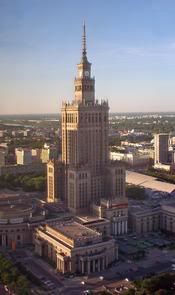Injustice to Poland
The Boston Globe :
TEARS WELL in Maria Buczyk's eyes as she talks about her 83-year-old mother. ''She lives in Chicago, and she's quite sick,' Buczyk says in a voice tense with emotion. Eugeniusz, her husband, pats her shoulder comfortingly. ''I really need to see her.'
We are standing in a courtyard of the American Embassy in Poland. The Buczyks are waiting in line to apply for visas so they can travel to the United States. This is their third time going through the process; they were turned down twice before, they say, after being interviewed by consular officers who barely glanced at their documents. ''They said I was going to immigrate,' Maria recalls -- i.e., remain in the United States beyond the 90 days allowed on a tourist visa. ''It's not true. I just want a month with my mother.'
Like everyone else in line, the Buczyks are carrying a sheaf of paperwork: passports, photographs, and a nonimmigrant visa application that had to be filled out on the Internet before being printed. Because Eugeniusz is in his 50s, he didn't have to complete the supplemental application required of all men up to age 45. (Sample query: ''Do you have any specialized skills or training, including firearms, explosives, nuclear, biological, or chemical experience?') On the other hand, he and Maria have brought along additional documents they hope will bolster their application -- a letter of invitation from a US citizen and a bank statement showing their savings in Poland. But these are optional, and the embassy's guidelines candidly warn that ''the consular officer may choose not to look at them if it appears that additional documents won't make a difference.'
Definitely not optional is the final item in the Buczyks' folder -- a bank check for $100, the mandatory ''visa services' fee that must be paid by anyone who applies for a US visa. In a country where $1,000 is the average monthly income, $100 is not a trivial sum, and as the Buczyks have learned, it is nonrefundable -- the embassy keeps the money whether a visa is granted or not. Nor is that the only cost: To schedule their interview, the Buczyks had to call a special embassy ''infoline" -- a call for which they were charged nearly $1.50 per minute.
The whole ordeal strikes Poles as overbearing, insulting, and unfair. Americans have been able to enter Poland without a visa for years; why, they ask, should Poles have to go through such a demeaning procedure in order to enter the United States? Especially -- this really sticks in the Polish craw -- when Washington has waived visa requirements for citizens of nearly every Western European nation, including Great Britain, France, Germany, Belgium, and Ireland.
US consular officials reply that Poland is not being discriminated against but that it simply hasn't met the conditions stipulated by Congress for inclusion in the visa waiver program -- starting with the requirement that a country's visa denial rate be no higher than 3 percent. Currently, about 25 percent of Polish visa applicants get rejected. But the 3 percent rule strikes many Poles as a Catch-22.
Article Tools
''Why are you refusing visas? What is it based on? The criteria seem to be things like -- students who aren't married and don't have a car or property get turned down," says Marek Purowski, a spokesman for the Polish Embassy in Washington. ''So an honest student in Poland who saves for many years in order to legitimately visit the US will be rejected, and then his rejection gets held against us" as a reason to require visas.
The visa issue has become the biggest irritant in US-Polish relations. ''It cuts across all layers of Polish society," says US Ambassador Victor Ashe. ''From the hotel chambermaid to the business executive, every Pole is familiar with this issue." With more than 9 million Americans of Polish descent, many Poles feel a particular kinship with the United States. That kinship has been reflected in national policy: At a time of rising anti-US sentiment, Poland has been notably pro-American.
Especially on Iraq. Not only did the Poles resist French and German pressure to be ''good Europeans" and oppose the war, they contributed more troops to the US-led coalition than any other European country except Britain and Italy. Naively, perhaps, they expected their support to be rewarded, and Washington's refusal to ease the visa requirement is widely interpreted here as ingratitude.
Sure, there are good reasons not to exempt Poland from the existing visa regime. But there is an even better reason to consider doing so, at least on a trial basis -- a reason articulated best by George W. Bush. ''Listen," the president told reporters in February, ''Poland has been a fantastic ally." Indeed it has. And in statecraft, as in private life, special friends deserve special consideration.














0 Comments:
Post a Comment
< Main